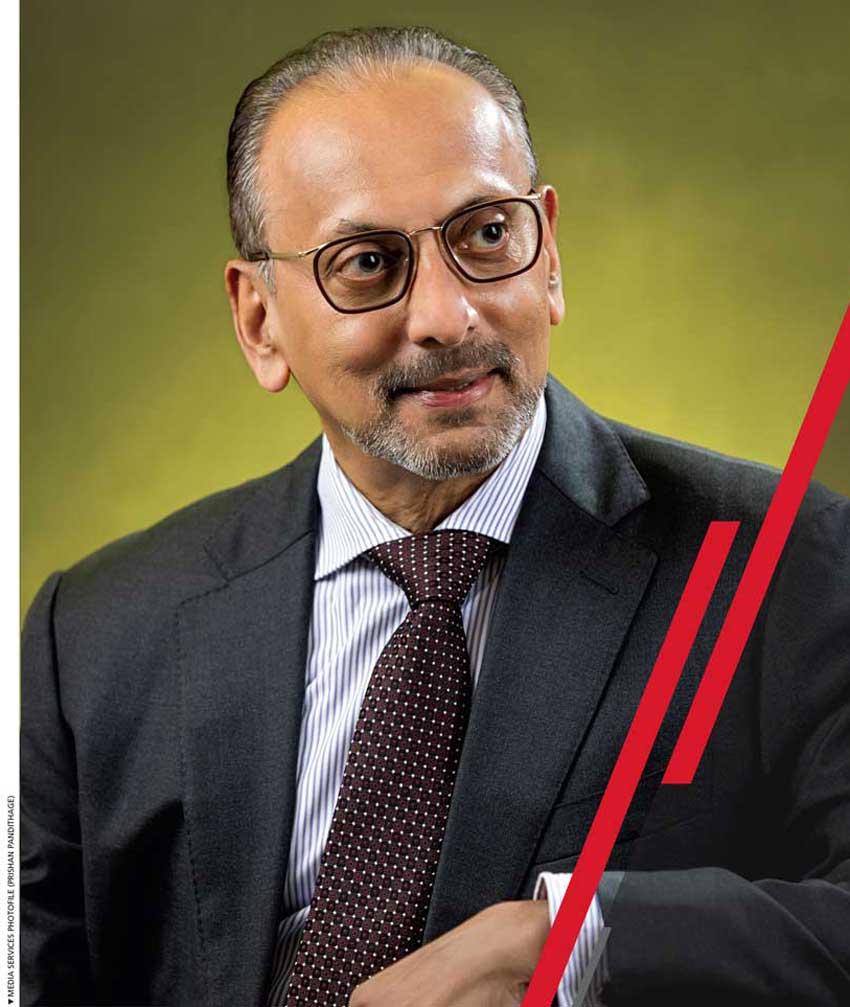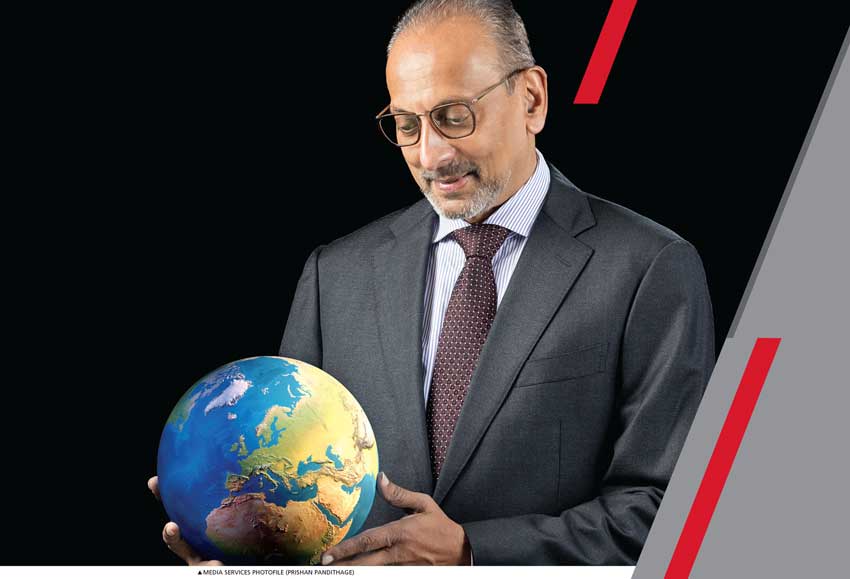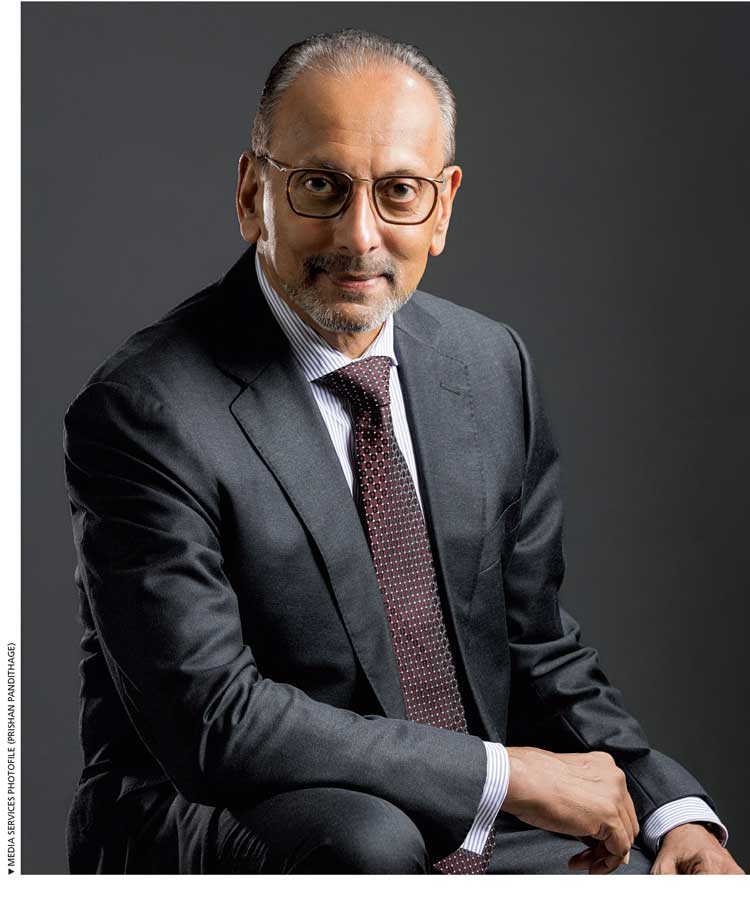Priyan Fernando
Art of the possible

With more than four decades of experience in the corporate world, Priyan Fernando has led multinational organisations in finance, travel and global business services. In addition to serving as a Senior Advisor to the Boston Consulting Group in New York, he is the Chairman of Brandix Lanka – a position he’s held since 2014.
Fernando has been credited with leading many transformations at American Express and as an advisor at the Boston Consulting Group, as well as playing a pivotal role in introducing shared financial services to India in the 1990s.
For the latter, he was conferred the Leadership Award by Shared Services Forum India (SSF) in 2017. He was also recognised as a key influencer by Business Travel World during his tenure at American Express.
In this exclusive interview for LMD International’s launch edition, Fernando shares his views on the outlook for the global economy, the skills needed to be an effective manager and the role of finance professionals in the modern workplace.
Additionally, he sheds light on Sri Lanka’s strengths in the context of its economy and as a nation.
Q: Given your four decades long tenure in the US, what are the pros and cons of living in the Western world – in the context of being ‘a Sri Lankan at heart’?
A: The United States provides a vibrant and diverse culture, and opportunities to enjoy a high standard of living, while enjoying the best of education, entertainment, healthcare and so on.
However, one needs to adopt a disciplined lifestyle, and be prepared to handle the stressful work culture and a limited safety net.
Sri Lanka’s culture is more collaborative and supportive. Therefore, it is more conducive to the power of teamwork. Additionally, I miss the beauty of our country, longstanding relationships, and the hustle and bustle of life in Colombo.
Q: As a former Executive Vice President of Global Services at American Express, and President and Chief Operating Officer of American Express Global Business Travel, and Senior Advisor to the Boston Consulting Group, where do you see the world economy heading this year?
A: I would say the watchword is ‘uncertainty.’ The markets and economists are at odds on the length and depth of a slowdown.
Moreover, the uncertainties of energy supplies and supply chains due to the conflict in Ukraine, and other geopolitical tensions combined with inflation, continue to be sources of concern.
However, thanks to the fiscal stimulus packages provided in the United States, companies and households have deleveraged and built up their balance sheets. I am optimistic about the resilience of the US economy and its ability to lead a global recovery.
Furthermore, recent developments in CRISPR gene editing, nuclear fusion technology and AI could potentially revolutionise our lives for the better.
Q: And as the incumbent Chairman of Brandix Lanka, how do you help steer the ship from overseas?
A: Brandix Lanka’s Group Chief Executive Officer Ashroff Omar, has an outstanding team of leaders at the helm of the company. My role is to ensure that the board establishes strong governance by providing guidance, and stress testing its strategy, talent and risk.
Despite the damage done to Sri Lanka’s reputation, we need to ensure that the apparel industry remains best in class.

Q: In our 21st century world and given the changes that are evolving by the day so to speak, what does it take to be an effective leader?
A: Today’s fast-paced digital environment demands outcomes produced at the speed and agility required by the marketplace. These outcomes are driven through cross-functional enterprise-wide processes, much of which have been automated using robotic process automation (RPA) and artificial intelligence (AI).
Unfortunately, organisations are built around the silos of control, not speed. To succeed in this environment, a leader is required to effectively manage across the enterprise, inspire employees to adopt a digital mindset and imagine new ways to add value.
They would need to lead their teams from satisfaction to engagement, and to inspiration and excitement in their work.
Today, most young people are disengaged at work. They want a purpose that will inspire and excite them. Leaders will need to engage at a different level to take them there.
We often say that people are our greatest asset. In this new world, employees should say that the workplace is their greatest asset. Organisations and people will succeed because they learn and embrace new technology with greater speed and agility than their competitors.
Leaders must model this and provide the ecosystem for these attributes to flourish.

Q: Could you describe the role of finance professionals in adding value to an organisation in this day and age?
A: Digital transformation has morphed many finance activities such as reporting, forecasting and analysis into streamlined and automated processes. As such, finance professionals will need to be more agile, use provocative analyses and be strategic to drive value in organisations.
They must focus on the art of the possible and model the drivers of the organisation to describe, predict, prescribe and provoke.
They will need to be all-rounders with a deep understanding of the business and ability to play anywhere. They need to be experts in tools related to big data analytics to provide new insights into business performance. This way, finance can become the talent factory of the organisation.
Q: What advice would you offer Sri Lankans who are planning to migrate to the developed world?
A: Companies need experience, not qualifications.
I would say that first, you must stay abreast of trends in your field and develop new skills. Second, take stretch assignments and learn to express yourself in a persuasive manner. Finally, build up your knowledge, and network with friends and professionals who could be of assistance.
Today, most young people are disengaged at work. They want a purpose that will inspire and excite them. Leaders will need to engage at a different level to take them there

Q: Sri Lanka is witnessing an unprecedented brain drain at this time. What measures will help reverse this trend, in your view?
A: Our country has experienced many self-inflicted tragedies but we have survived despite the resulting brain drain.
We have sufficient resources graduating from universities and professional institutions. Companies will need to strengthen their employee value propositions to compete for talent. Competition will draw underemployed graduates out of government jobs to a more merit-based corporate sector and raise the bar on productivity.
While Sri Lanka does not have the scale to compete with its neighbours, the nation certainly has the talent to go upscale and create premium jobs. The country should attract professionals from other nations.
I would stress that competition raises the bar and having foreign professionals in our workforce will certainly benefit us.

Our country has experienced many self-inflicted tragedies but we have survived despite the resulting brain drain
Q: What is your take on the idea that the ‘grass is greener’ in foreign lands?
A: The US is a land of immigrants, which provides ethnic diversity to make one feel quite at home. It is the hub for business, finance, fashion, entertainment and media, and has unlimited opportunities to learn and grow.
Economic and educational opportunities are provided by some of the world’s best corporates and universities.
However, the United States has its own challenges stemming from wide economic inequality, suppression of the poor, the high cost of healthcare, racial and social injustice, and gun related violence.
Severe polarisation is paralysing the political process. Nonetheless, it still delivers the American dream for those who are willing to pay the price.

FAMILY
Wife – Ruvani
Children – Shanya and Dimitri
Four grandchildren
SCHOOLING
Royal College
QUALIFICATIONS
Fellow member of the Institute of Chartered Accountants of Sri Lanka (CA Sri Lanka)
Fellow member of the Chartered Institute of Management Accountants (CIMA)
MBA (Indiana University Bloomington)
Executive coaching certification (Columbia University)
PRESENT OCCUPATIONS
Chairman – Brandix Lanka (Sri Lanka)
Senior Advisor – Boston Consulting Group (US)
RESIDENCE
Chatham (New Jersey) – United States
Q: Still on the subject of the brain drain, what can businesses do to mitigate the loss of talent?
A: Businesses will need to adapt to the new reality where people ‘come, grow and go.’ They will need to provide an environment for growth, recognition and learning, to attract and retain their talent.
This high churn environment will require that each person ‘has a successor and is a successor.’
Much of the value of a company is generated by a handful of critical employees. These employees must be ring-fenced and compensated commensurate with their value.
Q: Your leisure time activities include…?
A: I’m an avid squash player and fledgling jazz pianist. Beyond this, I thoroughly enjoy spending time with my four grandchildren.

Q: And last but not least, how would you describe your connection with Sri Lanka?
A: I have a love affair with my motherland. Because of my work with Brandix, I visit often and have engaged in many activities including a game changing initiative.
We run an educational technology (EdTech) platform, which has digitalised the government’s English textbooks for Grades 3-8. Today, children in many rural schools have one teacher – an interactive voice activated computer assisted programme.
Thanks to the sponsorship of Brandix, EnglishHelper Global, and the Ministry of Education, we have over 700,000 students enrolled in the programme and will achieve our goal of 1.5 million students by the end of this year.
